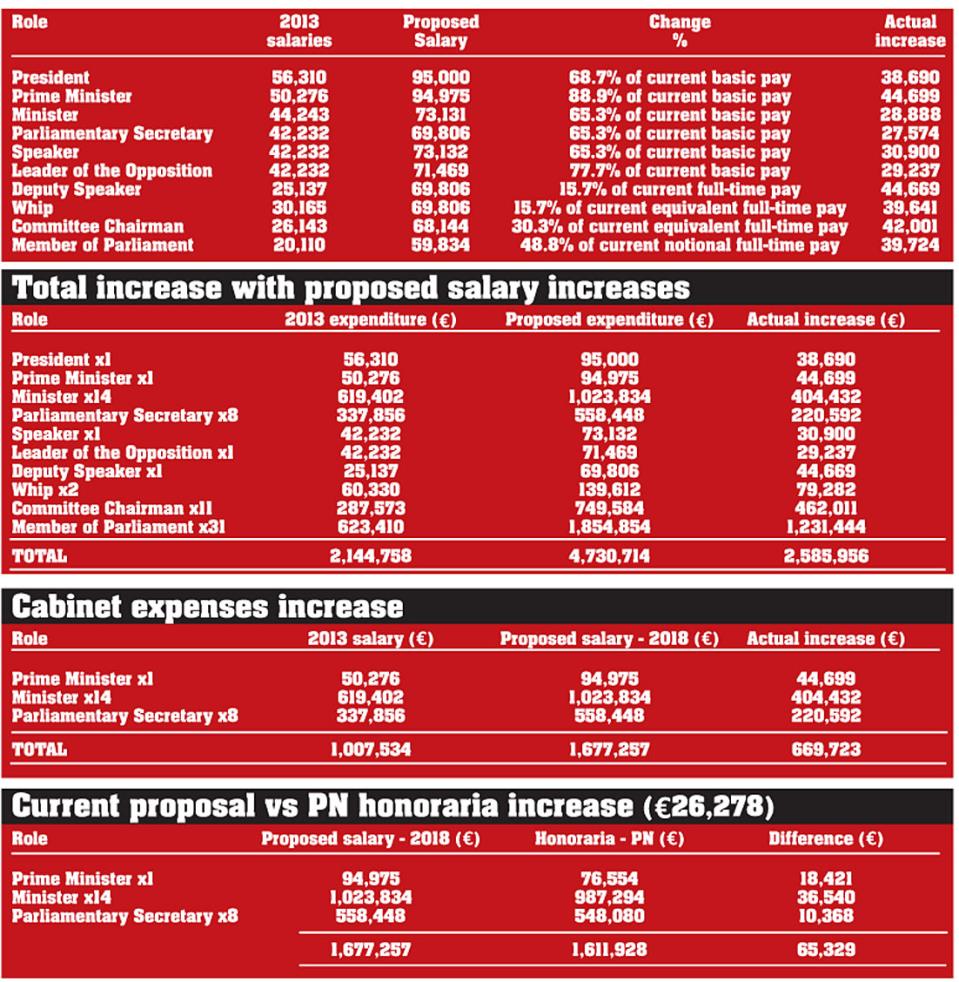The Opposition would be willing to discuss any report that proposes a pay rise for politicians but only after the Prime Minister admits that his five-year campaign on the honoraria issue was ‘deceitful and hypocritical.’
The joint statement was sent to The Malta Independent by PN MPs Jason Azzopardi and Claudette Buttigieg when asked, like a number of other of their colleagues, if they personally agreed that politicians are underpaid and therefore deserve a pay rise, and with the full-time MPs proposal.
In their reply, the PN MPs said that if there is anyone who should answer these questions it is Prime Minister Joseph Muscat, who “appointed a commission to propose higher salaries for politicians.” It said that, if the PM did not agree with a pay rise, he would not have commissioned the report.
The PN noted that the report proposes a weekly €1,000 increase in the Prime Minister’s salary and a weekly increase of more than €700 for MPs. “Now that the report has been revealed the Prime Minister is trying to shun his responsibility as if he was not the one who commissioned the report.”
Joseph Muscat, the Opposition said, had already increased the salaries of a number of his backbenchers. “His determination to do this ran so deep that he even changed the laws to allowed MPs to be given posts on public boards. The Opposition voted against these changes, which have allowed Labour MPs to earn thousands upon thousands a year.”

The PN said it would be ready to consider any report but it was laying down two conditions for this to happen. First, Joseph Muscat has to admit that his honoraria campaign was hypocritical and deceitful. The party said that it would never accept a €1,000 per-week pay rise for the Prime Minister.
Secondly, the Opposition reaffirms its belief that MPs should not be allowed to sit on public boards, in line with the recommendations of the same commission.
Different opinions on pay rise proposals
The report, which among other things proposes that the PM’s salary should increase from the current €51,000 to €95,000, was revealed by The Malta Independent on Sunday. It was drafted by a commission made up of Ombudsman Joseph Said Pullicino, Auditor General Anthony Mifsud and Chief Electoral Commissioner Saviour Gauci. The report was commissioned in April 2013 and was delivered to the Prime Minister in December of the same year.
It also proposes a €95,000 salary for the President, up from the current €56,000 and salaries of over €70,000 for the Speaker of the House and the Leader of the Opposition.
Perhaps the most controversial proposal is for MPs to become full-time. The report proposes a full-time salary of €59,000, replacing the current €20,000 honoraria. It recommends that, if Parliament should not be full-time, MPs would earn half the amount - €30,000. This would not affect the increase in salaries of the Prime Minister, Ministers and Parliamentary Secretaries, the Speaker and Opposition Leader. The proposed changes would come into effect during the next legislature.
In his initial reaction on Sunday, Prime Minister Joseph Muscat said he did not agree with a pay rise for politicians, neither in this legislature nor in the next. The PN, however, was quick to accuse the PM of being a hypocrite since “he would not have commissioned a report on pay rises if he did not agree with the concept.”
Yesterday, this paper published comments by a number of MPs who expressed different opinions on the two proposals. While many agreed that politicians are underpaid, the MPs had differing views on the full-time parliamentarian proposal, which would limit high-earners to a lower income. One PL MP, Marlene Farrugia, declared outright that elected MPs should leave their profession to serve full-time in Parliament. Others said MPs ought to have a choice and remarked that Members of Parliament in certain professions cannot just side line their normal day jobs and expect to return to them easily after a five-year term.